
Volume XVI, Issue XIV
Apollonius
By Bob Kirchman
Copyright © 2019, The Kirchman Studio, all rights reserved
Chapter 14: New Beginnings
The Great Northern was home. She was reassigned to her original destination as SS/AC006 and crews came aboard to install the Iron Dome system that would allow her to be a part of the defense against rogue missiles. Abiyah and some of the original crew made a few trips up to ‘hand her off’ but the station now was staffed on a rotation of one month on, one month off by Alaska Space Program regulars. No more would man spend prolonged time in space with its unknown consequences. The only deference to the mission to Mars was the decision to preserve the nursery. It was a welcome touch of home… particularly for some of the women crew members who set up the SKYPE lounge there with the running children in the mural as a backdrop. There they would talk to their own children on Earth and their children felt connection as they saw the playful scene surrounding their parent. The crew now was more like those in merchant service who can count on regular extended time at home when their tours are over. Mars was really the last world nearby that was explorable by humans. The large planets such as Jupiter had dense toxic atmospheres and intensely strong gravity. The service would return to their original plan and build sophisticated probes and rovers designed to survive the harsh conditions. Abiyah and Sarah wound up their report writing and their official assignment was coming to an end. They walked one evening a few houses down in Shalom to the home of Rupert and Pat Zimmerman for dinner, little son in tow. There they engaged in an interesting dialogue with the old engineer.
Well, I think it is safe to say that you two will go down in history as the first humans to set foot on Mars, but I am afraid we will not want to send you back.”
Sarah stifled a chuckle: “I should only want to make that journey once anyway.”
Yes, when our forefathers and mothers set sail for new worlds,” Zimmerman continued, “They did not find empty lifeless wastelands. They found rich lands inhabited by people who could show them the riches to be found there. Squanto was there to teach the Pilgrims how to farm, and Sacajawea was there to guide Lewis and Clark. Though it is disputed today, it is pretty clear that the first men and women crossed the Bering Strait upon a land bridge of some sort. They settled the land little by little and when others came they learned from the ones who went before how to survive there. Sadly, human nature being what it is, there was always conquest, land grabbing and killing… and that went on before the Europeans showed up and engaged in even more of it.”
History shows us that venturing forth into new worlds is never a sure thing. In 1587, John White brought more than 100 men, women and children with him in a small ship in the first attempt to found a permanent English colony in the New World. The group settled on Roanoke Island, one of a chain of barrier islands now known as the Outer Banks, off the coast of North Carolina. Later that year, White headed back to England to bring more supplies, but England’s naval war with Spain would delay his return for nearly three years. When he finally arrived on Roanoke Island, on August 18, 1590, White found the colony abandoned and looted, with no trace of the settlers. Only two clues remained: The word “Croatoan” had been carved on a post and the letters “CRO” scratched into a tree trunk. The settlers of Jamestown and Plymouth almost starved to death.”
So,” Sarah said, “There is no gradual and logical migration of humanity to the planets?”
No. And I was a fool to be taken in so quickly by George Apollonius in thinking that it would happen because we had a new space technology. Mankind needs to gain some real benefit from going out and I’m afraid Apollonius could only spin vain promises of undiscovered riches. His true motive was always to recast society in a way that he could control it. He thought if you could create the best all-powerful centralized government it would usher in a new age for mankind. The problem is that some of the darkest societies in the past century began with the same promise. Unfortunately control of mankind appears to be a poor substitute for actual redemption.”
God rest his soul, he and his fortune perished as the rocket fell back to Mars.”
Well,” said Rupert, “He left a sizable deposit in the bank of Wales to cover unforeseen costs of maintaining the colonies. He was so afraid of issuing bonds and having to answer to stockholders. We have been able to cover our costs from the Mars mission out of that and now there is enough left over to fund a couple of teaching endowments at the school of aerospace engineering.”
But, as you say, isn’t that pretty much a science that has been already pushed to its limits?”
Oh NO,” Replied Zimmerman, “I merely said that manned missions were done with, at least for the time being. Think about all of the old science fiction stories. They’d go to Mars and meet Martians and so space was like a giant world in itself. We’ll not meet anyone else in those hostile worlds we’ve actually seen so far. No Squanto… no Sacajawea! But that does not mean an end to exploration? On the contrary, we now have the ability to expend a reasonable amount of resources and learn incredible things. Who knows, we might even find a reason for mankind to venture out there again, but it shall not be over a challenge received at a dinner at the Reform Club!”
Epilogue: Joshua Adam Cohen-Ben Gurion
It was a bright Summer day a few years later on Big Diomede. Sarah and Abiyah’s son was playing in the attic bedroom of his favorite babysitter. The Greene’s eldest daughter and he played in a closet that Mrs. Greene had painted to look like the wardrobe doorway into Narnia and little Adam was enthralled by it. The boy often stared into the painting’s horizon… looking into another world it seemed. Major Cohen and her husband had settled in the biosphere upon their retirement, taking positions as professors of aerospace engineering at the college. They lived next door to the Greenes and Adam was quite happy with his new sitter! Sarah Cohen had just returned to pick up her son and she stood quietly in the doorway with Kris Greene watching the wonder.
Do you suppose he knows he was born in a most miraculous way?” Sarah Cohen mused.
I would be hard pressed to answer that.” said Kris, “But then, isn’t EVERY child’s birth a miracle… and aren't their little lives a glimpse into that unspoiled world of God’s creative Glory?”
Do you mean by that, Kris, that there is more of a connection to the Divine in this world than we suppose?” Sarah continued, “Could it also be true that our children are more adept at showing us the doorway than we give them credit for?”
THE END (Read JOSIAH)
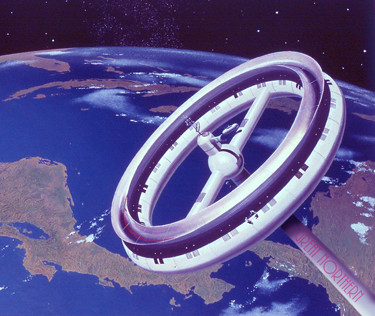
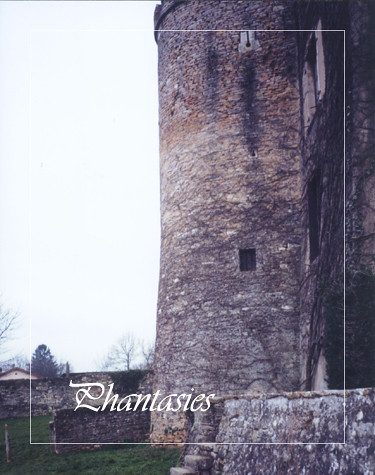
Volume XVI, Issue XIVa
Phantasies
By George Macdonald, Chapter 23
High erected thought, seated in a heart of courtesy."
~ Sir Philip Sidney
A sweet attractive kinde of grace,
A full assurance given by lookes,
Continuall comfort in a face,
The lineaments of Gospel bookes."
~ Matthew Roydon, on Sir Philip Sidney.
I had not gone far, for I had but just lost sight of the hated tower, when a voice of another sort, sounding near or far, as the trees permitted or intercepted its passage, reached me. It was a full, deep, manly voice, but withal clear and melodious. Now it burst on the ear with a sudden swell, and anon, dying away as suddenly, seemed to come to me across a great space. Nevertheless, it drew nearer; till, at last, I could distinguish the words of the song, and get transient glimpses of the singer, between the columns of the trees. He came nearer, dawning upon me like a growing thought. He was a knight, armed from head to heel, mounted upon a strange-looking beast, whose form I could not understand. The words which I heard him sing were like these:
Heart be stout,
And eye be true;
Good blade out!
And ill shall rue.
Courage, horse!
Thou lackst no skill;
Well thy force
Hath matched my will.
For the foe
With fiery breath,
At a blow,
It still in death.
Gently, horse!
Tread fearlessly;
'Tis his corse
That burdens thee.
The sun's eye
Is fierce at noon;
Thou and I
Will rest full soon.
And new strength
New work will meet;
Till, at length,
Long rest is sweet.
And now horse and rider had arrived near enough for me to see, fastened by the long neck to the hinder part of the saddle, and trailing its hideous length on the ground behind, the body of a great dragon. It was no wonder that, with such a drag at his heels, the horse could make but slow progress, notwithstanding his evident dismay. The horrid, serpent-like head, with its black tongue, forked with red, hanging out of its jaws, dangled against the horse's side. Its neck was covered with long blue hair, its sides with scales of green and gold. Its back was of corrugated skin, of a purple hue. Its belly was similar in nature, but its colour was leaden, dashed with blotches of livid blue. Its skinny, bat-like wings and its tail were of a dull gray. It was strange to see how so many gorgeous colours, so many curving lines, and such beautiful things as wings and hair and scales, combined to form the horrible creature, intense in ugliness.
The knight was passing me with a salutation; but, as I walked towards him, he reined up, and I stood by his stirrup. When I came near him, I saw to my surprise and pleasure likewise, although a sudden pain, like a birth of fire, sprang up in my heart, that it was the knight of the soiled armour, whom I knew before, and whom I had seen in the vision, with the lady of the marble. But I could have thrown my arms around him, because she loved him. This discovery only strengthened the resolution I had formed, before I recognised him, of offering myself to the knight, to wait upon him as a squire, for he seemed to be unattended. I made my request in as few words as possible. He hesitated for a moment, and looked at me thoughtfully. I saw that he suspected who I was, but that he continued uncertain of his suspicion. No doubt he was soon convinced of its truth; but all the time I was with him, not a word crossed his lips with reference to what he evidently concluded I wished to leave unnoticed, if not to keep concealed.
Squire and knight should be friends," said he: "can you take me by the hand?" And he held out the great gauntleted right hand. I grasped it willingly and strongly. Not a word more was said. The knight gave the sign to his horse, which again began his slow march, and I walked beside and a little behind.
We had not gone very far before we arrived at a little cottage; from which, as we drew near, a woman rushed out with the cry:
My child! my child! have you found my child?"
I have found her," replied the knight, "but she is sorely hurt. I was forced to leave her with the hermit, as I returned. You will find her there, and I think she will get better. You see I have brought you a present. This wretch will not hurt you again." And he undid the creature's neck, and flung the frightful burden down by the cottage door.
The woman was now almost out of sight in the wood; but the husband stood at the door, with speechless thanks in his face.
You must bury the monster," said the knight. "If I had arrived a moment later, I should have been too late. But now you need not fear, for such a creature as this very rarely appears, in the same part, twice during a lifetime."
Will you not dismount and rest you, Sir Knight?" said the peasant, who had, by this time, recovered himself a little.
That I will, thankfully," said he; and, dismounting, he gave the reins to me, and told me to unbridle the horse, and lead him into the shade. "You need not tie him up," he added; "he will not run away."
When I returned, after obeying his orders, and entered the cottage, I saw the knight seated, without his helmet, and talking most familiarly with the simple host. I stood at the open door for a moment, and, gazing at him, inwardly justified the white lady in preferring him to me. A nobler countenance I never saw. Loving-kindness beamed from every line of his face. It seemed as if he would repay himself for the late arduous combat, by indulging in all the gentleness of a womanly heart. But when the talk ceased for a moment, he seemed to fall into a reverie. Then the exquisite curves of the upper lip vanished. The lip was lengthened and compressed at the same moment. You could have told that, within the lips, the teeth were firmly closed. The whole face grew stern and determined, all but fierce; only the eyes burned on like a holy sacrifice, uplift on a granite rock.
The woman entered, with her mangled child in her arms. She was pale as her little burden. She gazed, with a wild love and despairing tenderness, on the still, all but dead face, white and clear from loss of blood and terror.
The knight rose. The light that had been confined to his eyes, now shone from his whole countenance. He took the little thing in his arms, and, with the mother's help, undressed her, and looked to her wounds. The tears flowed down his face as he did so. With tender hands he bound them up, kissed the pale cheek, and gave her back to her mother. When he went home, all his tale would be of the grief and joy of the parents; while to me, who had looked on, the gracious countenance of the armed man, beaming from the panoply of steel, over the seemingly dead child, while the powerful hands turned it and shifted it, and bound it, if possible even more gently than the mother's, formed the centre of the story.
After we had partaken of the best they could give us, the knight took his leave, with a few parting instructions to the mother as to how she should treat the child.
I brought the knight his steed, held the stirrup while he mounted, and then followed him through the wood. The horse, delighted to be free of his hideous load, bounded beneath the weight of man and armour, and could hardly be restrained from galloping on. But the knight made him time his powers to mine, and so we went on for an hour or two. Then the knight dismounted, and compelled me to get into the saddle, saying: "Knight and squire must share the labour."
Holding by the stirrup, he walked along by my side, heavily clad as he was, with apparent ease. As we went, he led a conversation, in which I took what humble part my sense of my condition would permit me.
Somehow or other," said he, "notwithstanding the beauty of this country of Faerie, in which we are, there is much that is wrong in it. If there are great splendours, there are corresponding horrors; heights and depths; beautiful women and awful fiends; noble men and weaklings. All a man has to do, is to better what he can. And if he will settle it with himself, that even renown and success are in themselves of no great value, and be content to be defeated, if so be that the fault is not his; and so go to his work with a cool brain and a strong will, he will get it done; and fare none the worse in the end, that he was not burdened with provision and precaution."
But he will not always come off well," I ventured to say.
Perhaps not," rejoined the knight, "in the individual act; but the result of his lifetime will content him."
So it will fare with you, doubtless," thought I; "but for me---"
Venturing to resume the conversation after a pause, I said, hesitatingly:
May I ask for what the little beggar-girl wanted your aid, when she came to your castle to find you?"
He looked at me for a moment in silence, and then said--
I cannot help wondering how you know of that; but there is something about you quite strange enough to entitle you to the privilege of the country; namely, to go unquestioned. I, however, being only a man, such as you see me, am ready to tell you anything you like to ask me, as far as I can. The little beggar-girl came into the hall where I was sitting, and told me a very curious story, which I can only recollect very vaguely, it was so peculiar. What I can recall is, that she was sent to gather wings. As soon as she had gathered a pair of wings for herself, she was to fly away, she said, to the country she came from; but where that was, she could give no information.
She said she had to beg her wings from the butterflies and moths; and wherever she begged, no one refused her. But she needed a great many of the wings of butterflies and moths to make a pair for her; and so she had to wander about day after day, looking for butterflies, and night after night, looking for moths; and then she begged for their wings. But the day before, she had come into a part of the forest, she said, where there were multitudes of splendid butterflies flitting about, with wings which were just fit to make the eyes in the shoulders of hers; and she knew she could have as many of them as she liked for the asking; but as soon as she began to beg, there came a great creature right up to her, and threw her down, and walked over her. When she got up, she saw the wood was full of these beings stalking about, and seeming to have nothing to do with each other. As soon as ever she began to beg, one of them walked over her; till at last in dismay, and in growing horror of the senseless creatures, she had run away to look for somebody to help her. I asked her what they were like. She said, like great men, made of wood, without knee-or elbow-joints, and without any noses or mouths or eyes in their faces. I laughed at the little maiden, thinking she was making child's game of me; but, although she burst out laughing too, she persisted in asserting the truth of her story.
Only come, knight, come and see; I will lead you.'
So I armed myself, to be ready for anything that might happen, and followed the child; for, though I could make nothing of her story, I could see she was a little human being in need of some help or other. As she walked before me, I looked attentively at her. Whether or not it was from being so often knocked down and walked over, I could not tell, but her clothes were very much torn, and in several places her white skin was peeping through. I thought she was hump-backed; but on looking more closely, I saw, through the tatters of her frock--do not laugh at me--a bunch on each shoulder, of the most gorgeous colours. Looking yet more closely, I saw that they were of the shape of folded wings, and were made of all kinds of butterfly-wings and moth-wings, crowded together like the feathers on the individual butterfly pinion; but, like them, most beautifully arranged, and producing a perfect harmony of colour and shade. I could now more easily believe the rest of her story; especially as I saw, every now and then, a certain heaving motion in the wings, as if they longed to be uplifted and outspread. But beneath her scanty garments complete wings could not be concealed, and indeed, from her own story, they were yet unfinished.
After walking for two or three hours (how the little girl found her way, I could not imagine), we came to a part of the forest, the very air of which was quivering with the motions of multitudes of resplendent butterflies; as gorgeous in colour, as if the eyes of peacocks' feathers had taken to flight, but of infinite variety of hue and form, only that the appearance of some kind of eye on each wing predominated. 'There they are, there they are!' cried the child, in a tone of victory mingled with terror. Except for this tone, I should have thought she referred to the butterflies, for I could see nothing else. But at that moment an enormous butterfly, whose wings had great eyes of blue surrounded by confused cloudy heaps of more dingy colouring, just like a break in the clouds on a stormy day towards evening, settled near us. The child instantly began murmuring: 'Butterfly, butterfly, give me your wings'; when, the moment after, she fell to the ground, and began crying as if hurt. I drew my sword and heaved a great blow in the direction in which the child had fallen. It struck something, and instantly the most grotesque imitation of a man became visible. You see this Fairy Land is full of oddities and all sorts of incredibly ridiculous things, which a man is compelled to meet and treat as real existences, although all the time he feels foolish for doing so. This being, if being it could be called, was like a block of wood roughly hewn into the mere outlines of a man; and hardly so, for it had but head, body, legs, and arms--the head without a face, and the limbs utterly formless. I had hewn off one of its legs, but the two portions moved on as best they could, quite independent of each other; so that I had done no good. I ran after it, and clove it in twain from the head downwards; but it could not be convinced that its vocation was not to walk over people; for, as soon as the little girl began her begging again, all three parts came bustling up; and if I had not interposed my weight between her and them, she would have been trampled again under them. I saw that something else must be done. If the wood was full of the creatures, it would be an endless work to chop them so small that they could do no injury; and then, besides, the parts would be so numerous, that the butterflies would be in danger from the drift of flying chips. I served this one so, however; and then told the girl to beg again, and point out the direction in which one was coming. I was glad to find, however, that I could now see him myself, and wondered how they could have been invisible before. I would not allow him to walk over the child; but while I kept him off, and she began begging again, another appeared; and it was all I could do, from the weight of my armour, to protect her from the stupid, persevering efforts of the two. But suddenly the right plan occurred to me. I tripped one of them up, and, taking him by the legs, set him up on his head, with his heels against a tree. I was delighted to find he could not move.
Meantime the poor child was walked over by the other, but it was for the last time. Whenever one appeared, I followed the same plan--tripped him up and set him on his head; and so the little beggar was able to gather her wings without any trouble, which occupation she continued for several hours in my company."
What became of her?" I asked.
I took her home with me to my castle, and she told me all her story; but it seemed to me, all the time, as if I were hearing a child talk in its sleep. I could not arrange her story in my mind at all, although it seemed to leave hers in some certain order of its own. My wife---"
Here the knight checked himself, and said no more. Neither did I urge the conversation farther.
Thus we journeyed for several days, resting at night in such shelter as we could get; and when no better was to be had, lying in the forest under some tree, on a couch of old leaves.
I loved the knight more and more. I believe never squire served his master with more care and joyfulness than I. I tended his horse; I cleaned his armour; my skill in the craft enabled me to repair it when necessary; I watched his needs; and was well repaid for all by the love itself which I bore him.
This," I said to myself, "is a true man. I will serve him, and give him all worship, seeing in him the imbodiment of what I would fain become. If I cannot be noble myself, I will yet be servant to his nobleness." He, in return, soon showed me such signs of friendship and respect, as made my heart glad; and I felt that, after all, mine would be no lost life, if I might wait on him to the world's end, although no smile but his should greet me, and no one but him should say, "Well done! he was a good servant!" at last. But I burned to do something more for him than the ordinary routine of a squire's duty permitted.
One afternoon, we began to observe an appearance of roads in the wood. Branches had been cut down, and openings made, where footsteps had worn no path below. These indications increased as we passed on, till, at length, we came into a long, narrow avenue, formed by felling the trees in its line, as the remaining roots evidenced. At some little distance, on both hands, we observed signs of similar avenues, which appeared to converge with ours, towards one spot. Along these we indistinctly saw several forms moving, which seemed, with ourselves, to approach the common centre. Our path brought us, at last, up to a wall of yew-trees, growing close together, and intertwining their branches so, that nothing could be seen beyond it. An opening was cut in it like a door, and all the wall was trimmed smooth and perpendicular. The knight dismounted, and waited till I had provided for his horse's comfort; upon which we entered the place together.
It was a great space, bare of trees, and enclosed by four walls of yew, similar to that through which we had entered. These trees grew to a very great height, and did not divide from each other till close to the top, where their summits formed a row of conical battlements all around the walls. The space contained was a parallelogram of great length. Along each of the two longer sides of the interior, were ranged three ranks of men, in white robes, standing silent and solemn, each with a sword by his side, although the rest of his costume and bearing was more priestly than soldierly. For some distance inwards, the space between these opposite rows was filled with a company of men and women and children, in holiday attire. The looks of all were directed inwards, towards the further end. Far beyond the crowd, in a long avenue, seeming to narrow in the distance, went the long rows of the white-robed men. On what the attention of the multitude was fixed, we could not tell, for the sun had set before we arrived, and it was growing dark within. It grew darker and darker. The multitude waited in silence. The stars began to shine down into the enclosure, and they grew brighter and larger every moment. A wind arose, and swayed the pinnacles of the tree-tops; and made a strange sound, half like music, half like moaning, through the close branches and leaves of the tree-walls. A young girl who stood beside me, clothed in the same dress as the priests, bowed her head, and grew pale with awe.
The knight whispered to me, "How solemn it is! Surely they wait to hear the voice of a prophet. There is something good near!"
But I, though somewhat shaken by the feeling expressed by my master, yet had an unaccountable conviction that here was something bad. So I resolved to be keenly on the watch for what should follow.
Suddenly a great star, like a sun, appeared high in the air over the temple, illuminating it throughout; and a great song arose from the men in white, which went rolling round and round the building, now receding to the end, and now approaching, down the other side, the place where we stood. For some of the singers were regularly ceasing, and the next to them as regularly taking up the song, so that it crept onwards with gradations produced by changes which could not themselves be detected, for only a few of those who were singing ceased at the same moment. The song paused; and I saw a company of six of the white-robed men walk up the centre of the human avenue, surrounding a youth gorgeously attired beneath his robe of white, and wearing a chaplet of flowers on his head. I followed them closely, with my keenest observation; and, by accompanying their slow progress with my eyes, I was able to perceive more clearly what took place when they arrived at the other end. I knew that my sight was so much more keen than that of most people, that I had good reason to suppose I should see more than the rest could, at such a distance. At the farther end a throne stood upon a platform, high above the heads of the surrounding priests. To this platform I saw the company begin to ascend, apparently by an inclined plane or gentle slope. The throne itself was elevated again, on a kind of square pedestal, to the top of which led a flight of steps. On the throne sat a majestic-looking figure, whose posture seemed to indicate a mixture of pride and benignity, as he looked down on the multitude below. The company ascended to the foot of the throne, where they all kneeled for some minutes; then they rose and passed round to the side of the pedestal upon which the throne stood. Here they crowded close behind the youth, putting him in the foremost place, and one of them opened a door in the pedestal, for the youth to enter. I was sure I saw him shrink back, and those crowding behind pushed him in. Then, again, arose a burst of song from the multitude in white, which lasted some time. When it ceased, a new company of seven commenced its march up the centre. As they advanced, I looked up at my master: his noble countenance was full of reverence and awe. Incapable of evil himself, he could scarcely suspect it in another, much less in a multitude such as this, and surrounded with such appearances of solemnity. I was certain it was the really grand accompaniments that overcame him; that the stars overhead, the dark towering tops of the yew-trees, and the wind that, like an unseen spirit, sighed through their branches, bowed his spirit to the belief, that in all these ceremonies lay some great mystical meaning which, his humility told him, his ignorance prevented him from understanding.
More convinced than before, that there was evil here, I could not endure that my master should be deceived; that one like him, so pure and noble, should respect what, if my suspicions were true, was worse than the ordinary deceptions of priestcraft. I could not tell how far he might be led to countenance, and otherwise support their doings, before he should find cause to repent bitterly of his error. I watched the new procession yet more keenly, if possible, than the former. This time, the central figure was a girl; and, at the close, I observed, yet more indubitably, the shrinking back, and the crowding push. What happened to the victims, I never learned; but I had learned enough, and I could bear it no longer. I stooped, and whispered to the young girl who stood by me, to lend me her white garment. I wanted it, that I might not be entirely out of keeping with the solemnity, but might have at least this help to passing unquestioned. She looked up, half-amused and half-bewildered, as if doubting whether I was in earnest or not. But in her perplexity, she permitted me to unfasten it, and slip it down from her shoulders.
I easily got possession of it; and, sinking down on my knees in the crowd, I rose apparently in the habit of one of the worshippers.
Giving my battle-axe to the girl, to hold in pledge for the return of her stole, for I wished to test the matter unarmed, and, if it was a man that sat upon the throne, to attack him with hands bare, as I supposed his must be, I made my way through the crowd to the front, while the singing yet continued, desirous of reaching the platform while it was unoccupied by any of the priests. I was permitted to walk up the long avenue of white robes unmolested, though I saw questioning looks in many of the faces as I passed. I presume my coolness aided my passage; for I felt quite indifferent as to my own fate; not feeling, after the late events of my history, that I was at all worth taking care of; and enjoying, perhaps, something of an evil satisfaction, in the revenge I was thus taking upon the self which had fooled me so long. When I arrived on the platform, the song had just ceased, and I felt as if all were looking towards me. But instead of kneeling at its foot, I walked right up the stairs to the throne, laid hold of a great wooden image that seemed to sit upon it, and tried to hurl it from its seat. In this I failed at first, for I found it firmly fixed. But in dread lest, the first shock of amazement passing away, the guards would rush upon me before I had effected my purpose, I strained with all my might; and, with a noise as of the cracking, and breaking, and tearing of rotten wood, something gave way, and I hurled the image down the steps. Its displacement revealed a great hole in the throne, like the hollow of a decayed tree, going down apparently a great way. But I had no time to examine it, for, as I looked into it, up out of it rushed a great brute, like a wolf, but twice the size, and tumbled me headlong with itself, down the steps of the throne. As we fell, however, I caught it by the throat, and the moment we reached the platform, a struggle commenced, in which I soon got uppermost, with my hand upon its throat, and knee upon its heart. But now arose a wild cry of wrath and revenge and rescue. A universal hiss of steel, as every sword was swept from its scabbard, seemed to tear the very air in shreds. I heard the rush of hundreds towards the platform on which I knelt. I only tightened my grasp of the brute's throat. His eyes were already starting from his head, and his tongue was hanging out. My anxious hope was, that, even after they had killed me, they would be unable to undo my gripe of his throat, before the monster was past breathing. I therefore threw all my will, and force, and purpose, into the grasping hand. I remember no blow. A faintness came over me, and my consciousness departed.
(to be continued)
Springhill Hollyhocks
Photos by Bob Kirchman



Every Summer they appear!, remnants of a garden planted long ago that continue to brighten the drive into Staunton along Churchville Avenue. What a great living legacy for a gardener!
Vincent, Don McClean
Tolkien: Maker of Middle Earth
[click to read]
Tolkien: Maker of Middle Earth is the new show at The Morgan Library in Manhattan. It’s a charming tribute to J.R.R Tolkien (1892‒1973), the Oxford professor best known for writing The Hobbit, in 1937, and The Lord of the Rings, the high-fantasy novels published in three volumes in 1954 and 1955. The Lord of the Rings, in which Tolkien constructed an astonishing and elaborate world of heroes, villains, adventure, pursuit, and peril, is one of English literature’s most widely read novels. (read more)
Staunton Mall Renaissance
A New Vision for an Older Mall
Concept Development by Bob Kirchman

Strong anchor stores position the mall for future vitality...

...as the central mall becomes a place for concerts, tea dances...
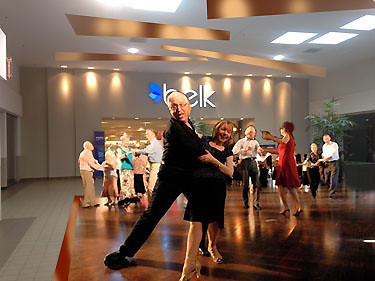
...and a lively expression of Staunton's community life!
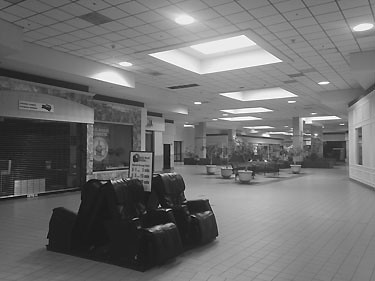
The large open spaces...
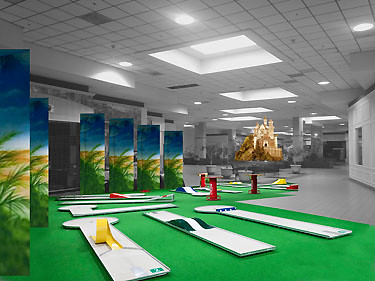
...now invite a variety of recreational options in all seasons.
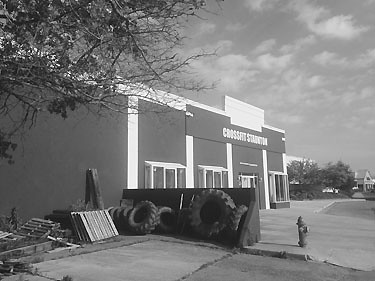
Existing spaces can become more inviting...
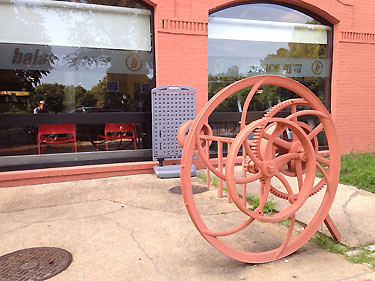
...through invigorating design.

The attractiveness of the space is increased...
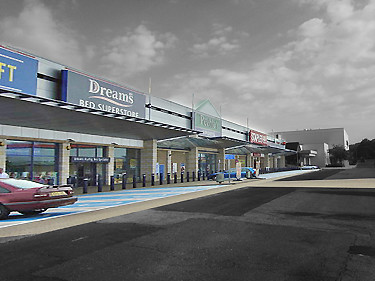
...by a phased opening out of the retail units to meet today's demands.
Isambard Kingdom Brunel
England's Legendary Bridge Builder

Volume XVI, Issue XIVb
The Ministry of Building Things
I'll bet if I asked you to think of some different types of ministry and ways to build the Kingdom of G-d, you probably wouldn't think of Economic Development. Pastor Tim Keller, in his book: Resources for Deacons, sees it clearly as a part of the Diaconal ministry. Our church helps women in Zambia get sewing machines. To be sure, the gift of the ability to earn their living as seamstresses is an act of ministry to these ladies.
But think bigger! THYME presents the story of how a nation turned from a great evil and one city suffered greatly in doing so. G-d provided a provider! Then G-d provided provision for the provider by inspiring great innovation that came to revitalize that great city. Should we dare to pray for such innovation and inspiration in our own day?
Isambard Kingdom Brunel
What a Nineteenth Century Innovator Can Teach Us Now
© 2013 The Kirchman Studio, All rights reserved.
They say that the condition for a miracle is difficulty, but the condition for a great miracle is impossibility” -- Angus Buchan, “G-d's Farmer”
When William Wilberforce [1.] had ended the slave trade in the British Empire, he had thrown the city of Bristol, England into economic depression. The port there was heavily devoted to that wretched business and suffered heavily when it was brought to a sudden halt. The unintended consequence had been a rise in children condemned to a life of poverty. Ending the vile business of enslaving Africa's children had resulting in England's society spurning the needs of her own. Into this world came George Müller [2.], who, relying on faith in G-d alone, provided redemption for thousands of orphans. Many of these children were cast-offs of a society in economic despair.
George Müller [3.] had seen the wretched street urchins most people despised as jewels to be polished. Muller, relying solely on Divine provision, built five large houses for Orphans at Ashley Downs in Bristol, England. He trained the girls to be nurses, teachers, clerical workers and domestics. He apprenticed all the boys in various trades. He was excoriated for training these unwanted children "above their station." He ignored the critics.
Müller looked to G-d alone, but Bristol needed an outfowing of Divine provision to provide for her children. G-d's provision for Bristol was to come in the form of inspiration and innovation, embodied in the work of a young pioneer of civil engineering. He also ignored his critics.
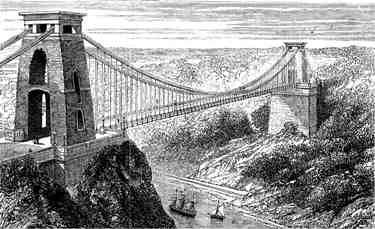
Brunel's Clifton Suspension Bridge became the symbol of the City of Bristol.
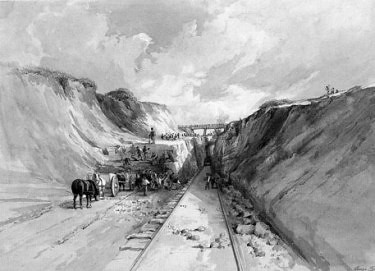
Building the Great Western Railway.
In 1831, 24 year old Isambard Kingdom Brunel [4.] was awarded a contract to bridge the Avon Gorge. It was the dream of a prosperous wine merchant who provided the initial funding. The completed bridge would become the symbol of the city, but lack of funding dogged the project. It took thirty years to complete it. For years only the towers stood completed. In 1833 Brunel began work on the Great Western Railway, which would become the instrument of Bristol's economic revitalization. The nicknames: "Great Way Round" and "G-d's Wonderful Railway" seem to describe well Brunel's great work.
Brunel was an innovator. He probably experienced as many failures as successes in his short lifetime. Born on April 9, 1806, the son of Sir Marc Brunel, he assisted his father in building a tunnel under the Thames. He would later become the resident engineer of that project. At twenty years of age, he designed a suspension bridge to cross the Avon river. A modified version of his plan was actually constructed.
At 26, Brunel was building the Great Western Railway, commissioned to maintain Bristol's importance as a port and position her for trade with America. This wide-gauge railroad linked Bristol and Western regions of England to London. Bristol's prosperity as a port was assured and the work of Müller created solid citizens with strong spiritual foundations to benefit.
But Brunel was not content to simply build a better railway. He looked across the Atlantic, envisioning fleets of ocean greyhounds -- great steamships that would complete the linking of his Great Western Railway to America! The S. S. Great Britain was his creation. It was the first metal-hulled propeller-driven ocean ship and became the prototype for modern ocean liners.
Building the South Devon Railway as a spur to the Great Western, Brunel experimented with an alternative to steam engines -- Vacuum tube powered trains. Stationary vacuum plants evacuated tubes laid along the center of the track that powered the movement of trains.

Brunel's 'Atmospheric Railway.'
The technology required the use of leather flaps to seal the vacuum pipes. The natural oils were drawn out of the leather by the vacuum, making the leather vulnerable to water, rotting it and breaking the fibres when it froze. It had to be kept supple with tallow, which is attractive to rats. The flaps were eaten, and vacuum operation lasted less than a year, from 1847 (experimental service began in September; operations from February 1848) to 10 September 1848.[45] It has been suggested that the whole project was an expensive flop. In Brunel's favour, it has been noted that he had the courage to call a halt to the venture instead of struggling on with it at greater cost." -- Wikipedia
Like alternative transportation prototypes of our day, the vacuum tube system was more expensive. The accounts of the SDR for 1848 show that atmospheric traction cost 3s 1d (three shillings and one penny) per mile compared to 1s 4d/mile for conventional steam power.Though considered a failure at the time, vacuum powered trains may have been a distant precursor to Evacuated Tube Technology [5.] which is now being developed to move entire transport capsules through large tubes -- essentially powered in the same way as Brunel's South Devon train. Brunel was simply two Centuries before his time on this.
What can we learn from Brunel today? Plenty! Inspiration and innovation are needed now as they were needed then. Brunel teaches us valuable lessons about expanding vision with proven technologies and wisely exploring alternatives (and abandoning them when they do not work as planned).
Praying people see the diaconate role of economic development as an integral part of G-d's provision. In “Resources for Deacons, Love Expressed Through Mercy Ministries,” [6.] Tim Keller states his belief in three “levels” of mercy in diaconal ministry:
The first Level Is Simple Relief: That is taking care of the immediate need.
The Second Level Is Economic Development: That is teaching the poor how to get out of poverty by teaching them how to handle money, property, etc. and furnishing them with the means to do so. “Not handouts, but ownership is the way to break the cycle of poverty.”
The Third Level Is Social Reform: Christians should be involved in the culture in an effort to change the social structure.
We see it very localized in a place like Zambia, where people of faith instruct widows to become seamstresses (and people in America gift them with sewing machines). But, can we believe G-d for ever greater inspiration? What vision would G-d give us for our family, our company of employment, our city and county... and beyond? Müller said "the age of miracles is not past." Angus Buchan [7.], in the turmoil of Zambia and South Africa, looked to G-d for inspiration. G-d met him in a corn field where he learned the power of prayer!
Buchan had packed his family up during the unrest in Zambia in the late 'seventies and moved them to South Africa. A successful farmer in Zambia, he felt that he would be happy if he could acquire another farm in South Africa. It didn't. Experiencing deep depression, Buchan was angry and confused. Wandering into a lay-witness Sunday at the local Methodist Church, Angus heard builders, tradesmen and fellow farmers tell of what Jesus meant in their lives. For the first time he saw men crying, he wept unashamedly himself as he responded to an altar call. He took the Lord seriously about the changed life promise.
Buchan went back to his farm and learned to pray in his own corn field. Then he sought to minister to his Zulu workers. His farm manager, Simeon Bhengu, told him: "that's women's religion..." But G-d met Angus and spoke through his friendship with Simeon. Today the men are brothers in faith and brothers in every way. "My children are his and his are mine." Angus says of his Zulu brother. Angus expanded his farming operations and G-d's miraculous provision was seen at every turn. The movie "Faith like Potatoes" is the true story of Angus Buchan and it is quite inspiring! Buchan used machinery but avoided totally mechanizing the farm, looking to provide steady employment to his Zulu neighbors.
In the early 1980's Buchan became aware of a new tragic development. AIDS was ravaging families and creating untold numbers of orphans. Buchan reached out to these orphans but had no place to house them. A local school had temporary classrooms they were going to demolish and Angus received permission to take them apart and reassemble them at Shalom, which he had named his complex at the farm. At first the children lived in dormitories but gradually Angus was able to create "houses" where one "mother" cared for a smaller number.
South Africa in her recent history has experienced much uncertainty and Buchan's experience is instructive as we look to address the turmoil in our own country today. Isambard Kingdom Brunel should serve as an inspiration as well.
Let no man despise thy youth; but be thou an example of the believers, in word, in conversation, in charity, in spirit, in faith, in purity." -- 1 Timothy 4:12

Volume XVI, Issue XIVc
Happy Birthday I. K. Brunel
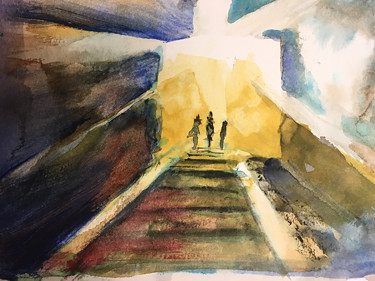
On the birthday of Isambard Kingdom Brunel, it is said that light shines all the way through his Box Tunnel on the Great Western Railway. Painting by Bob Kirchman.
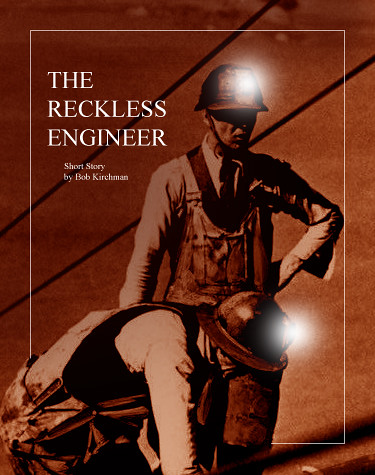
Volume XVI, Issue XIVd
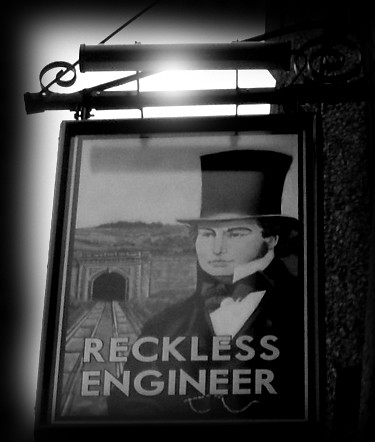
The Reckless Engineer
Short Story by Bob Kirchman
And all the people without dreams
Oh they laughed and oh they mocked in vain
You never needed monuments
Look at the Cornish sky and Bristol gorges”
-- Coast, ‘The Reckless Engineer’
Better drink up” the bartender said. “This is the last pub in the Western Hemisphere. Diomedes are dry and there’s only cheap vodka for 2000 miles after that.” The young couple, who were staying at the hotel complex in Wales, AK, were anxious about the next phase of their ‘Around the World’ tour. There was only an older gentleman sitting there with them in a corner of the room… nursing a gin and tonic as he sat musing. “He might be able to tell us,” the young woman opined.
Sure enough, the question as to the unusual name of the establishment caught his attention.
The Reckless Engineer... hmmmm, where do I begin. Well, the reference is to a gentleman who lived in the Nineteenth Century. He was Isambard Kingdom Brunel. Most people in the New World don’t have a clue, but the Brits revere him. He basically built the modern infrastructure of a great empire… railroads, tunnels, bridges, and great ocean-going ships! But it was a tunnel that almost killed him before his time.”
His father, Mark Brunel was a French expat and an inventor. He came up with a method of tunneling underwater and set to work to prove it by tunneling under the Thames. It still exists. It is part of the London Underground, but it was a daring move in the day it was built. The biggest problem was the uncertain composition of the earth under the river. It had been dredged and had unmapped holes in it. The younger Brunel was in charge of a crew excavating the bore and when water rushed into the tunnel, he was almost swept to a certain death. His assistant, a Mr. Beamish, plucked the young man to safety. Several colleagues who were with him were not so fortunate. They drowned in the rush of river water and sewage that flooded the tunnel.
Young Isambard went to the seacoast city of Bristol to recuperate. But he was not the sort to relax on holiday so he entered a competition to design a bridge to span the Avon Gorge there. Mind you, he’d never designed a bridge in his life, but he came up with several beautiful renderings for a suspension bridge over the gorge. Britain’s great engineer, Thomas Telford was to judge the contest. He rejected all of the entries and supmitted his own proposal. The people of Bristol hated it. In the end, Brunel’s beautiful design was chosen. The gorge was high and Brunel built a cable ferry to transport men and materials across it. Once when the basket snagged on the cable, young Isambard climbed out of the basket and hung precariously while he freed the mechanism. There is a pub in Bristol by the railway station that was the first to be named ‘The Reckless Engineer.’”
But why is this place, at the end of the world, also named ‘The Reckless Engineer’?” the young woman asked.
The Twenty-first Century was not so much unlike the Nineteenth,” the old man said. “After a period of great prosperity followed by great uncertainty, another engineer, perhaps not so young stood on the coast of Wales here, about to embark on the project that linked two continents. I’ll tell you a secret… HE’d never designed a bridge either. His Daughter and her husband provided most of the brain power for the actual design. The team of O’Malley and O’Malley are the real force behind the great bridge. Rupert Zimmerman was more of a showman. He convinced investors to back what was then a rather audacious undertaking. His daughter Elizabeth created beautiful renderings following the design laid out by her more practical husband.
And so, camped on the shore right where this hotel stands, Zimmerman and Martin O’Malley camped to survey the scene of their great work. If you go to the cheesy ‘Rupert Zimmerman Museum’ here in Wales, they’ll tell you how they heroically survived a fire that destroyed their tent and their provisions. They used their survival training to last the week there and returned to Nome as something of a sensation… but that is not the true story. O’Malley and Zimmerman stood on the shore of the Strait, drinking prodigious quantities of their favorite beer as they toasted their new venture.
They decided to go for a swim in the Strait. They didn’t think about how cold the water was and when they fumbled to build a fire they succeeded in burning up their tent!”
So, what about the part about him being in the war and all… what really happened there?”
Well, he really did lose a leg fighting in the battle of Anchorage and he went to Nome to recuperate. He idea for the great bridge came to him there and as his daughter came to Nome to care for him, she really did meet and marry O’Malley. They get that part right.”
And the part about him riding out the great storm on the partially built span?”
True as well, but I think Zimmerman really believed in the cable anchoring system and the pontoon span’s integrity. Soon enough the motoring public would be trusting the same system… not really as heroic as they make it out to be.”
And his childhood, hopping freight trains and all…”
Can’t deny it. I don’t think he was as brave as they make him out to be. Still, we’d all agree that he had a pretty amazing life.”
So, what’s next for him. The bridge just opened this past November. Now you can actually drive to Isambard Kingdom Brunel’s England on a highway. What does a man like that do… I guess he can retire and take life easy. Say, is it true that Brunel and Zimmerman were both short in stature and somehow driven by insecurity about it?”
I can’t speak personally for Brunel but I think you pretty well nailed it.”
The night passed quickly. The old man was a repository for so much information about the bridge and its construction. But he asked the young couple to tell their story as well. They somewhat nervously said that they had decided to embark on this adventure but that they had applied to the School of Engineering and Operations run by the Zimmerman organization in Wales. “I doubt if we have a shot at it, but we had to give it a try.” the young woman added. We met at Virginia Tech and discovered that we were more like this Brunel… reckless and all, than most of our colleagues. Sir, are you familiar at all with the school here?”
Oh, I know a thing or two about it.” The old man replied.
Is it true that they went back to the old bench-test and physical model methods from the old U.S. Space Program?” “Yes, it is true, and when you are there you will study these methods as well.”
The evening was growing late. The young woman remarked that she wished it possible that they could somehow find a way to get a ‘hard hat’ tour of the new biosphere being built on Big Diomede the next morning. “We’re staying here several days.” I don’t know who would be able to arrange that. If we could afford it, we’d be happy to pay.”
The old man wrote a phone number on a cocktail napkin and handed it to her. “Call this number in the morning, and depending on how long you are here for, you could see the new biosphere and some of the inner workings of the bridge as well.”
Oh, thank you so much! We’ll call first thing in the morning. You know we’d love to see as much as they are willing to show us! Say, who should we ask for, Mr… oh, I’m so sorry, I never learned YOUR name?”
Rupert,” the man responded, “Rupert Zimmerman, and I am quite pleased to meet you both.”
*********
You built the railroads from the West
You built the ships from iron ore and
All of your bridges never rest
But without love they're nothing more”
-- Coast, ‘The Reckless Engineer’
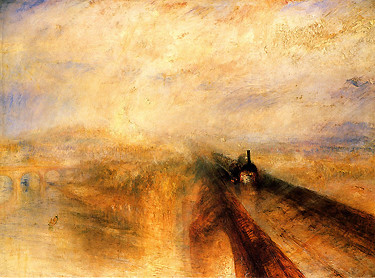
Rain, Steam and Speed - The Great Western Railway, by J. M. W. Turner. 1843
John and Alana (for that is the young couple’s names) arrived early the next morning at the offices of the Zimmerman Organization high in a tower overlooking the Strait. They were ushered into the reception area by a lovely young lady who had a distinct sparkle in her mischievous green eyes. “Hello, I’m Hannah,” she greeted them. “Mr. Zimmerman will be with you momentarily, but would you like some coffee?” “Uh, sure,” the young couple responded as Rupert’s receptionist zipped around the corner of her ample desk, grabbed a tray and dispensed their choices of beverage and placed it on a table by their chairs.
Please excuse my zipping about. My ‘Bionic’ leggings are being retuned today so I’m back in the chair for a bit. If you’d like, we could show you a bit of the research lab before you take the grand tour.” Alana’s eyes grew wide. “I’ve heard many amazing things about the lab. I would LOVE to see it!” She remembered the wonderful story of how Alexander Graham Bell had begun his research with the effort to give sound to the deaf. Here in the remotest part of the world, his legacy continued. “The lady who developed the assistive leggings and I work closely together,” said Hannah. “What is really cool is how they are truly assistive. They do nothing FOR me, but rather provide a little extra steam and steadiness to MY walking. You will see some amazing things happening here… artificial sight for the blind, direct transfer of sound to nerves, and a whole new level of prosthetics.”
We would love to see as much as you are willing to show us,” said John, “We are in no great hurry to venture off into Siberia.”
Good,” because we have three days worth of tour if you’d like it!”
This is what I call the ‘Labyrinth of Exile’” Zimmerman began as they walked through the tower’s endless corridors. “It’s named after a biography of Theodor Herzl, Father of the modern state of Israel, from where many of our brightest researchers hail from.” Indeed the small nation was well represented, as was most of the rest of the world in the serious faces that greeted them over the course of the next three hours. Zimmerman was clearly delighted to introduce every one of them, like the cherished family he considered them to be. “Don’t make the mistake of thinking me any less than the tough old bird you’ve heard me to be. I crack the whip around here!” “Yes Papa, you do,” said a young woman in white coveralls and a hard hat. She had slipped up behind them, placing herself deliberately behind the old man’s back… he feigned displeasure at her looking over his shoulder, but his face betrayed a deep love for the young lady.
Well, I suppose you should meet my GRANDDAUGHTER,” he said somewhat in a feigned disparaging way. “She will be with us tomorrow when we tour the great bridge, but today I wonder if she would be willing to show you our design rooms?”
On the boards were two great designs for covered entrances to the great bridge. If the bridge was spare and functional, the approach covers were anything but. They were drawn in the style of Santiago Calatrava, the great bridge architect. Zimmerman called them “Paddington Station” and “Temple Meade” after the great trainsheds of Nineteenth Century designer Isambard Kingdom Brunel. “We sort of specialize in ‘reckless engineering’ here,” he said. Zimmerman’s granddaughter chimed in: “Calatrava’s genius was that he saw the design disciplines as one and that the wonder of living things could guide you in it. Papa sent me to study under him for a while.”
Calatrava built bridges, buildings, even children’s toys, but his mind was the same in all of these disciplines. Nature, if you were quiet and observed it, was your true teacher.”
*********
All of the Reckless Engineer has gone And where now does heart and soul beat in the city sky?”
-- Coast, ‘The Reckless Engineer’
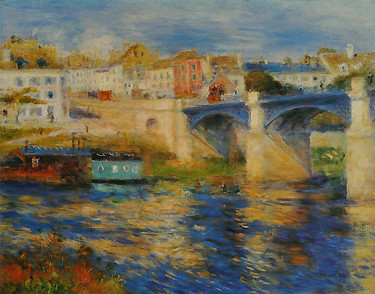
Le Pont de Chatou, Pierre Auguste Renoir
A bridge is a complex machine… or perhaps more like a living organism in that it moves and needs to be constantly renewed,” Rupert said as the little group entered the service stairway down into one of the great span’s floating piers. “In the Twentieth Century, great public works were authorized, heavily funded by the U. S. Federal government. In fact, they had a 90% match to 10% state funds. They did think of maintenance, it was supposed to have been funded by fuel taxes… but with the initial outlay for the bridges being so relatively cheap, it became all too easy for politicians to divert the funds that were supposed to be allocated for ongoing maintenance.
Fifty years after the great interstate highways were begun, an appalling percentage of the bridges on it were in questionable condition. Some of them actually failed outright.”
Alana and John soaked in the vast history of modern bridge building. Surely it was comforting to know that the operators of this bridge had learned some lessons from the past. Their tour had begun on the next morning… Saturday, but since they were on the International Date Line, the designation on operations calendars was Saturday/Sunday. Zimmerman had met them at the operations tower, beginning with the scores of monitor screens that allowed operations technicians to watch over the workings of Zimmerman’s ‘Darling Bridge,’ as he called it. That was a reference to Brunel’s affection for the Clifton Gorge span more than an infatuation of Rupert’s however.
Where is Hannah?” Alana asked? “Oh,” said Rupert, “She’s off today, but I suspect we’ll see her when we stop for lunch at the Big Diomede site.” I think she was going to paint landscapes with Mrs. Greene after church there today if the weather was nice.”
Sure enough, after a morning of ascending and descending into towers, piers and passageways, the entourage emerged on the large island in the middle of the strait to a balmy afternoon. The brief tundra flower explosion was brightly covering the wild plateau of Big Diomede and there overlooking the colorful display and the sea beyond, two women stood at easels painting en plein air. They looked like a Renoir painting themselves standing upon the verdant island. The wildness of this place dwarfed even the massive biosphere dome under construction. There was a raw beauty to this place and the timeless figures who painted it only added to its mystique. Under the freshly constructed dome a small lone house rose. Workmen were putting the finishing touches on it.
Rather than eat at the service plaza, I thought we’d prepare a nice picnic supper,” Mrs. Greene said after introductions. They were soon joined by Reverend Greene and Elizabeth Zimmerman O’Malley, Rupert’s daughter. It seemed like a fine Southern ‘dinner on the grounds,’ which indeed it was the remnants of, as it was Sunday on Big Diomede and the little church that met in the service plaza meeting room had indeed enjoyed such a feast earlier in the day. It was like a warm breeze from another Century… indeed even the driven Zimmerman seemed to slow down for it. John was impressed: “I did not expect food like I grew up on in… SIBERIA!” he exclaimed as he enjoyed a portion of macaroni and cheese that gained him a scornful glance from Alana, the health nut. But even she was obviously reveling in a bit of home so far from home.
Tomorrow I will give you the full tour.” Said Elizabeth, but today we will continue on with the inner workings of the great bridge. “Tonight,” Hannah said, “I would love for you to be my dinner guests at my condo in Wales. Would you?”
The day ended with the sun low in the sky and the last descent into a bridge pier where Rupert opened a hatch. His granddaughter smiled: “You’re showing them the fishing spot!” she happily exclaimed. Indeed they found rods and a small catwalk outside the hatch where they cast for some nice ocean fish. “We’ll cook them up at Hannah’s place,” Rupert said. “But I’m afraid I won’t be able to join you as this blasted cell phone is now giving me the message that we have an issue with the bridge seals in sector 217. I’m afraid I’ll have to set up a work zone tonight.
Indeed the dinner group shrunk to John, Alana, Elizabeth and Hannah. As they gathered in her condominium, Elizabeth took a call. The work on the seals was going badly. She excused herself. “My father will kill himself for his ‘darling bridge’ if I don’t go out to take some of the load off. Thankfully some of his senior guys have his back and call me like this.”
Tell me about the biosphere,” said Alana. “I just KNOW there is a story behind it.” Hannah looked about, walked over to her door and locked it. Slowly and deliberately she began: “When Mr. Z started this project, he was a pretty brash, no nonsense sort of ruthless industrialist. He ‘reaped where others sowed’ if you know what I mean. There is something you guys need to know about him. You’re in the program by the way, just don’t breath a word to HIM. I know though… I saw the look of satisfaction on his face when we met the relamping crew on the bridge. Alana, when you did not hesitate to climb up with the bulb… the man was one short, remember… you sealed your fate. I daresay the offer will be coming tomorrow.”
Hannah continued:
Zimmerman is a tough old bird, he fought in the battle of Anchorage and all, but when he began this great work people began to see another side of him. There was a young engineer and surveyor that he took under his wing. They went out to Siberia to lay out the road and discovered that it was like the Wild West out there. Trucks that broke down or wrecked by the side of the road were left there. After the local bandits looted them they set them on fire. Rusted and burning hulks were everywhere.
By the time you could get a recovery truck out there, the deed had already been done. The bandits would pull a driver out of his truck if it stopped out there and kill him.
Well, Mr. Z and this other young man were camped out there with plenty of guards… or so they thought, when they were ambushed and kidnapped. The bandits managed to pick off their security people. They took Mr. Z and his friend captive, knowing there would be big ransom money. When they missed Elizabeth’s frantic response and thought the money was being stalled, they took the young man away. That was the last time Mr. Z saw him alive.
The ransom money finally came and Mr. Z. was returned. When he returned to Wales he immediately organized a group of Alaska National Guard and they travelled back disguised as a road crew. When they got back to the site of the ambush, they discovered that the body of the younger man had been found in a cheap motel room in a trailer motel that was… well… not a nice place. The body was stripped and smelled of vodka. Rupert er I mean Mr. Z knew the man never drank. He was enraged that the perpetrators would sink to creating a sordid story. Zimmerman knew the man’s wife and children.
That was the only time I ever saw Rupert cry, and he wept unashamedly. I knew then that a man I had thought so cold and aloof loved deeply. He could be moved to tears by the loss of a cherished colleague.
He composed himself pretty quickly, however. His men could not get the local authorities to help them find the killers so in the end, in his great anger, he ordered everyone out of the motel buildings at gunpoint and soaked the place with petrol. Then he burned it to the ground. He returned to Wales visibly shaken but back to his old aloof self. He set up a trust for his friend’s widow and children and spoke at the memorial service of his fine service. But he was holding something inside that he couldn’t let go.
The flashbacks returned from his war days. Everyone thinks the reason he’s estranged from his wife Pat is that she doesn’t like cold places. The truth is he wakes up screaming… and he won’t seek help for it. He visits her regularly in Virginia but the truth is HE doesn’t want her here when he falls apart. He won’t let go of his anger and sorrow. I fear it is going to kill him one day!
The biosphere you saw today… its more than an environmental experiment… It is largely the creation of Elizabeth, but you must know that it is Rupert’s true ‘darling’ in that he sees it as an antidote to the “Hell on Wheels” he found across the strait. He claims to have no faith… that pretty much went away in his childhood he says. He ‘survived’ indoctrination by the ‘Sisters of Mercy.’ He says they showed none.
But he knew that his biosphere would be nothing more than glass and steel if it did not have some sort of a soul. That is why he convinced the Greenes to come up here. If you didn’t notice before, see how he lets down his guard in their hospitality. Tomorrow you must see the renderings Elizabeth and Mrs. Greene have prepared for the biosphere. These are not the works of one who merely desires austere efficiency.
I really don’t know why I am telling you all this, but I sense that you may indeed be in a position to help him. He allows Elizabeth and his granddaughter to come closer, but I feel like he’s a clock wound too tight… and working in two concurrent times, I fear he’s going to break!”
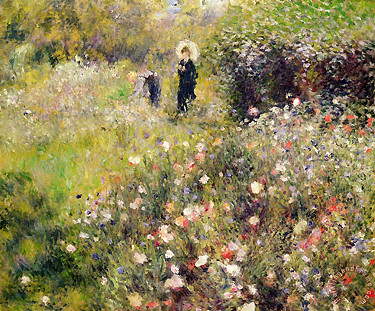
Summer Landscape, Pierre Auguste Renoir
*********
I am opposed to the laying down of rules or conditions to be observed in the construction of bridges lest the progress of improvement tomorrow might be embarrassed or shackled by recording or registering as law the prejudices or errors of today.”
-- Isambard K. Brunel
Sunday/Monday dawned early. Hannah greeted John and Alana at Zimmerman headquarters. “Elizabeth will be here in a bit,” she said. “Long night with the bridge seals!” A bleary-eyed Rupert popped out of his office: “How was dinner?” he asked.
Quite nice,” Alana responded, “And how did the work go on the seal problem?”
Zimmerman explained the seal problem… it seems that sustained temperatures combined with heavier stressed connections was taking more of a toll on them than anticipated. “Say John, you’re a materials guy. Would you look at this tech brief and when you get back here this Fall, would you like to have a go at it?”
Does that mean we’ve been accepted for the program then?” He responded. “Sure. Let me read this tonight. My thesis was on something similar with flexible pipe couplings. Maybe we can find a way to take some of the stress off of the seal itself in the meantime.”
I like that,” said Rupert. “Most guys just start wanting to remake the seal material straight off. You seem to have another tack. Tell me more.”
Well, sir, it seems the problem is exacerbated by the movement in the bridge. If we could add some sort of a stiffener, we could spread the stress better. I mean, you seem to be experiencing very localized failures at places the bridge moves more than others.”
So, in the minutes before Elizabeth arrived, the young couple had sketched out a pretty interesting clamping system that would spread the flexing evenly along the length of the span. Zimmerman was visibly impressed. “Hey, we could talk about this with your team tomorrow if you’d like.” Alana said. “That is, if you wouldn’t mind.”
When Elizabeth arrived, the congratulations were officially offered. Alana and John would sign on as mentees for their first year. They would be given accommodations and a small stipend until their year-end review, when they would likely be looking at $100K in petrodollars each per year starting salary. Of course, if the seal relief system played out, they would be receiving a bonus for that. Zimmerman, who had seen plenty of his ideas taken by employers with no attribution, had no problem sharing the glory when his own team, even the mentees, made valuable contributions.
But now it was time to head over out to Big Diomede, a half-hour drive West on the bridge. Elizabeth drove John and Alana across the span… but she spoke little. She was tired, sure, but clearly something was on her mind. “I’ve never seen someone get accepted so quickly,” she mused quietly. “You know, John, you remind me of…” she caught herself and was silent for the remainder of the trip. It seemed a long half-hour indeed and when the car finally reached the Big Diomede site, everyone was relieved when Mrs. Greene greeted them. She had worked with Elizabeth in the creation of the Biosphere and sure enough, the renderings of the proposed complex were stunning. It was something out of another Century so far as its craftsmanship and execution. The parsonage was the only building built so far, but it was simple and beautiful; quite a contrast to the prefabricated world of Wales. A lone tree, freshly planted, graced the yard. Nearby there was a footer where stonemasons were laying the first course of a more substantial building. Elizabeth pointed to a painting of a gothic chapel… “A memorial to a man who lost his life in the service of the Zimmerman Organization,” said Mrs. Greene. “The chapel will be home to our church here.”
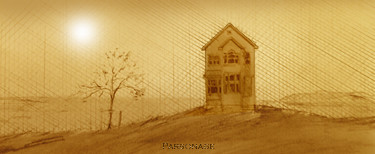
The biosphere was a fascinating place. Artificial sun-spectrum lighting was being installed along the bars of the geodesic dome which had ionized panels that could be clear for natural light but could be clouded to reflect the light from the lamps down. Huge rigs were drilling down to provide thermal heating. Nursery workers were planting quick growing shrubbery to provide air refreshment inside.
At lunchtime, the Greene’s again hosted what Mrs. Greene referred to as ‘Elevensies.’ This time in their newly finished dining room. “Tell me about the man who the chapel memorializes,” Alana said to Kris Greene as John and Elizabeth were in deep discussion of geothermal piping following their delicious lunch. “Oh,” said Kris, “I myself never knew him… but I understand he was a close friend of Rupert’s. They were working on the Great Western Road alignment in Siberia, I think, when…” Elizabeth interrupted: “I think we’d better get on with our tour now. Thank you, Kris, for your warm hospitality.”
Back at Wales, Elizabeth was summoned by her cell phone… the bridge never ceased to call on her keepers, it seemed. She apologized for her demeanor. “Rough day, it has been,” she said. Hannah was there, eager to show the young couple some of the photos on the wall in the lobby. “Here is the place where we were drilling for oil, but Rupert discovered that the people were all sick for lack of water. Well, he threw a curve-ball into the calculations for the lateral drill. When it gushed not oil, but fresh water, his crew groaned at his ‘mistake,’ but when he capped it the people had a good and steady supply of safe water. Everyone here sort of goes along with the legend that he’s a real cheapskate… but you did see the beginnings of the Big Diomede Chapel, didn’t you. That is not a shabby piece of work at all.”
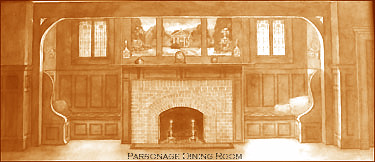
Rendering by Lola Dalton, 1914, the Author's Grandmother.
Alana spoke: “Do you mind if I ask you, ah, about Mrs. O’Malley; what is it that is troubling her? When we were accepted, I mean, it seemed she has some great reservations or something. Look, we don’t want to come here if you have any doubt that is sincerely based.” Hannah thoughtfully replied: “This is not the time or place, but please come to my place tonight and we’ll talk further. My husband is in the ‘lower 48’ representing our interests in Washington, a thankless part of his job. I’ll be glad when he’s done, but in the meantime it would be wonderful to have some company!”
We don’t say his name here,” Hannah said softly… “Rupert’s colleague who died in the Taiga, but it is clear that he… and his daughter Elizabeth, see the resemblance. He was young, reckless and would go to the ends of the earth… but he had a young family. I would imagine Elizabeth sees her father performing penance, if you will, for the death of his trusted friend. Oh, don’t sweat that. I’ve reviewed your qualifications. You are more than what we require in every way, but I think you will have to deal with the fact that Rupert sees in you an unfinished life. He’s not going to go easy on you, mind you, his granddaughter is the apple of his eye, but he rode her harder than the rest of them. I do not think Elizabeth’s unspoken fears are rational, but fears seldom are.”
So, what shall we do?,” Alana asked.
I don’t know, really, but I suspect that in time this will prove to be a good thing. You came here prepared to be patient, and the present situation requires plenty of that. Elizabeth is quite protective of her father, and I think she has good reason, but she is fair minded. I think you will prove yourself in the end and you will find her a lovely person to work with. In the meantime, I think it best to avoid discussion of a certain unfortunate occurrence… and of Rupert’s attempt to remember it.”
Rupert Zimmerman awoke that night screaming. He came to himself in a cold sweat and got up and checked the lock on his door. His was the top apartment in the condominiums over the workspaces and Elizabeth and Martin were directly below. He hoped he hadn’t disturbed them, but he knew full well that he had. He didn’t know that Hannah’s apartment, though it was further away, allowed her to be disturbed as well. Rupert Zimmerman was a man who professed no need for the Divine… but in the endless night, as Rupert raised the blinds in the hopes that the midnight sun would free him from his prison, his daughter, son-in-law and his devoted assistant prayed to the God Rupert spurned. Back in Virginia, Pat couldn’t sleep. Rupert weighed heavily on her mind. Thirty miles away from Wales, as a new day began at the end of the world, a young woman took her husband’s hand to pray as well: “I’m concerned for Elizabeth’s father.” She prayed. Though Zimmerman would have scoffed at the very notion, his friends that moment were speaking in unison to that God, pleading for the deliverance that only He could give.
If we must have heroes and wars wherein to make them, there is no war so brilliant as a war with the wrong, no hero so fit to be sung, as he who has gained the bloodless VICTORY of truth and mercy."
-- I. K. Brunel
(the Reckless Engineer is the Prelude to PONTIFUS [6.])
Copyright © 2017, The Kirchman Studio, all rights reserved
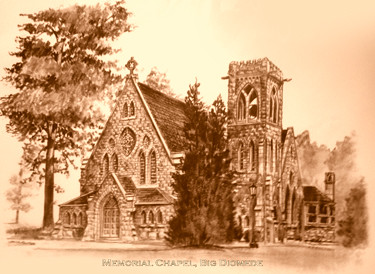
PONTIFUS, The Bridge Builder's Tale
[click to read]
The History of Serial Fiction
Serials have existed in fiction for a very long time. Books were expensive back in the 19th century, so they were printed in installments in order to keep the price low. Charles Dickens, often heralded as one of the greatest early self-publishers, was also one of the most successful writers of serialized fiction. Another big name, Alexandre Dumas, was a very prolific serial novelist, publishing both The Count of Monte Cristo and The Three Musketeers in serial format. In fact, serialization worked so well, it was considered the way to go by popular authors during the time." -- Samantha Warren
THYME Magazine presents, in serial form, the story of a man who challenged the proposition that something he wanted to achieve was "impossible." Based on history, depicted in the future, Pontifus is a tale of human triumph in the face of challenges such as face us today. (read more)
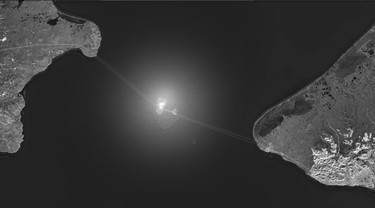
Sunlight reflects from the biosphere domes of Big Diomede in this photograph of the Bering Strait Bridge from space.

The twin spans of the Bering Strait Bridge. The original span (closest) is the Charles Alton Ellis Memorial Bridge. The second span is the Joseph Baermann Strauss Memorial Bridge.

The twin spans stretching to the West and Asia.
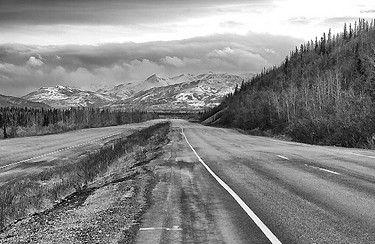
Alaska A2.
Copyright © 2017, The Kirchman Studio, all rights reserved
New 'Old' Architecture
The Inspiration for the Buildings of Big Diomede
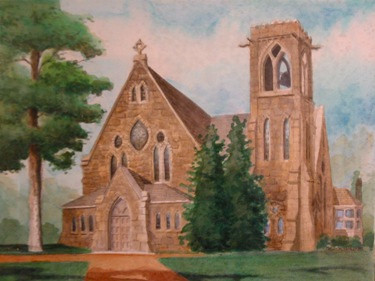
The Church on Big Diomede is based on my painting of the University of Virginia Chapel.
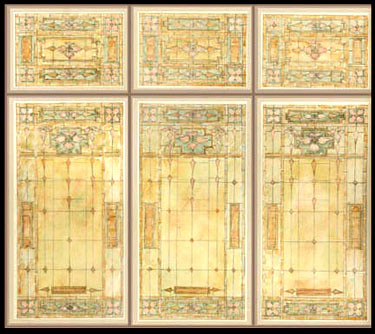
My Grandmother, Lola Dalton Carpenter, designed this window for a stairwell in 1914. I carried it into the Twenty-first Century as a window at the College on Big Diomede.
At the turn of the Century, as the Twentieth Century began, the great world's fairs presented a vision of civic architecture for America's young cities. A beautiful classicism prevailed, inspired by the model of Greek and Roman architecture. As the McMillan Plan transformed Washington DC into a very beautiful city, it put in place a sort of architectural order. The civic buildings of the metropolis all followed the form of Greek and Roman architecture. The great Cathedral and Catholic shrine rose in Gothic and Byzantine forms, thus creating a wonderful order for religious architecture as distinctive.
For Big Diomede, it seemed appropriate to again visit the past for ordering the future. Thus I returned to classicism for the College and Gothic for the Chapel, the precedent being Thomas Jefferson's University of Virginia... a beautiful campus in the Palladian style. Jefferson omitted a place of worship, perhaps by design, but in the 1880's a chapel Designed by Baltimore architect and University alumnus Charles Emmet Cassell was erected. The chapel’s materials, site, and style signify it as a Christian building in contrast to the Academical Village. Upon the chapel’s dedication, Professor Maximilian Schele de Vere proclaimed that while the Rotunda represented “in cold though classic beauty the outlines of a pagan temple,” the chapel aspired to Heaven with its “pointed window” and “flying buttress.”
In 1980 I was married to my beautiful wife in that chapel, about a century after it was first proposed. Thus that building is very special to me. The Zimmerman Stone Mountain Proposal Story is the story of my own proposal! Yes, the Divine sent a Storm! We like to think it would have happened anyway, without the Heavenly pyrotechnics, but it remains a great story.
Grandma's window and Inglenook found their way into the story simply because the images fit the mission, and I love them. She was a student at the Maryland Institute in 1914 and produced most of her work in those years. She married O. F. Carpenter, a successful Madison businessman and painted as an avocation until her eyesight failed in the 1970's. Lola Dalton Carpenter was extremely talented and had studied fashion design. In a later part of the story, yet to be told, a nod to Kris' efforts in this discipline is really a shout to Grandma, who all of us credit with our own creative impulses. My cousin in Oregon is an incredible photographer. My own children are very good too. We all thank Lola Dalton Carpenter for blazing the creative path for us!
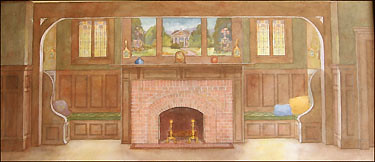
My Grandmother, Lola Dalton Carpenter, designed this ingelnook in 1914. Of course, it was exactly the look I wanted for Kris' house on Big Diomede.

I added the chalk drawings in front of one of my renderings to create the exterior.
Copyright © 2017, The Kirchman Studio, all rights reserved
The Reckless engineer, available at: www.coastrock.co.uk
Sarah Guppy
[click to read]
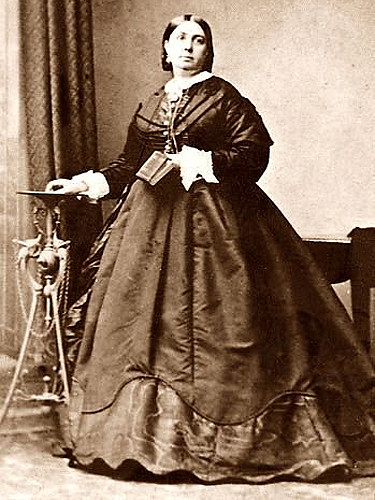
Sarah Guppy and her husband, Samuel Guppy had six children, Samuel Guppy Junior, Thomas Richard, Sarah Maria Ann, Mary Elizabeth, Robert and Grace. Thomas Richard Guppy would become one of Isambard Kingdom Brunel's assistants, working with him on the construction of the ships Great Britain and the Great Western. Sarah herself is said to have made models for Brunel of his inventions.
Motherhood and Invention
By Mike Rendell
I used to live in Richmond Hill in Bristol and was aware of the green plaque a few doors down advising the world that it used to be the home of Sarah Guppy, an English inventor who lived between 1770 and 1852. Indeed I always parked my car in the tree-filled garden opposite her home at 7 Richmond Hill, unaware that she had bequeathed it to the city on condition that it was not built upon. It remains as a delightful, quiet, enclave right in a busy part of the city.
But what of Sarah Guppy the inventor? It is fair to say that female inventors are few and far between in the Georgian and Victorian era, for one very good reason. If a woman was married she could not own property in her own name – and as a patent was intellectual property this meant that a woman could not apply for a patent in her own name and had to do so via her husband.
Nevertheless Mrs Guppy can lay claim to an extraordinarily eclectic mix of inventions. Where for instance would we be without a device to prevent barnacles forming on boat hulls? She earned a contract with the British Navy worth £40,000 for that one. Or even more usefully, for the safe piling of bridge foundations (patented in 1811 and used free of charge by Thomas Telford when building his bridge over the Menai straits, and by Isambard Kingdom Brunel with the Clifton Suspension bridge some ten years later). She never sought to charge a licence fee for her pile-driving ideas because she regarded them as being for the public benefit.
She also put forward a scheme to prevent soil erosion on railway embankments by planting willow and poplar trees, while my favourite invention was one which modified a samovar-type of tea urn to enable you to boil an egg in the steam while at the same time keeping the toast warm on a steam-heated metal plate. An ideal breakfast maker in fact!
In between time Sarah invented a way of keeping fit in the bedroom – patenting a sort of hybrid bed-come-gym, with drawers beneath the bed forming steps for exercise, and with bars suspended from the ceiling for developing upper-body strength. Other patents covered a type of fire hood for the kitchen. She also devised a modified candle holder which would enable candles to burn for longer, and a method of caulking wooden boats so that they were more sea-worthy.
In all Sarah took out ten patents in the late Georgian and early Victorian period – a remarkable achievement. (read more)
Brunel’s Mentor
Preparing for the birthday edition story on Isambard Kingdom Brunel, I discovered a second attribution for the Clifton Suspension Bridge, Sarah Beach Guppy. Apparently she briefly was thought to have created the design for the bridge over the Avon Gorge because she had patented an iron chain bridge design in 1811. The problem is that her design is substantially different from that used by Brunel. Still, it is of note that a woman born in the Eighteenth Century had ten patents to her name. Born in 1770, Sarah married a merchant named Samuel Guppy and they had six children. Mr. Guppy’s business took him to London and the family was friends with the family of Marc Brunel. That Marc and Sarah were both inventors certainly created some sort of bond. Although it is commonly believed that Marc Brunel was Isambard’s primary teacher, it seems Sarah became a special mentor to the young man. He was 36 years younger than her.
When young Isambard arrived in Bristol he had never actually designed a bridge. His work to that point had been assisting his father Marc in the construction of the Thames Tunnel. Barely escaping death when the tunnel collapsed, young Brunel went to Bristol to convalesce. Some historians speculate that Guppy collaborated in the design for the Clifton Bridge. Other sources say that she built models of Brunel’s designs. This points to the distinct possibility that Sarah not only collaborated with Marc and Isambard, but served as a mentor to the younger Brunel. Her first invention was a method of making safe pilings for bridges. Thomas Telford asked her for permission to use her patented design and she gave it to him free of charge. She was generous with her genius.
As a friend of Isambard, she helped in the creation of the Great Western Railway, making many recommendations to the directors of the company. In 1841 she recommended planting willows and poplars to stabilize the railroad embankments. Her son Thomas would later become an assistant to Isambard Kingdom Brunel, working on the Great Britain and the Great Eastern. Young Isambard even painted a portrait of Sarah. The two families enjoyed a rich shared creativity. Isambard and his wife Mary were great patrons of the arts. I did not know Isambard was a painter himself, although his renderings and the detailing of his projects show his artistry.
As to the attribution of the Clifton Suspension Bridge, the work would appear to be original with Brunel, still, great design does not happen in a vacuum and Sarah Beach Guppy deserves recognition for her contribution – even if it was simply her mentorship of a great designer.

The Laying of the First Stone for the Railroad.
The Vision of Charles Carroll
July 4, 1828 the last surviving signer of the Declaration of Independence took part in an important ceremony as he turned the first spade of earth at the symbolic laying of the first stone of the Baltimore and Ohio Railroad. Fifty-two years after he put his name to the document that began our nation, Charles Carroll of Carrollton participated in an event that looked to her future. Indeed, inspired by the Ellicott Brothers [click to read], Carroll had already diversified agriculture on his large estate in Howard County, Maryland. He had helped build flour mills and limestone mills that in turn helped to create a more sustainable agriculture. The Quaker Ellicotts had migrated to this "picturesque wilderness" from Bucks County, Pennsylvania and partnered with Carroll, a Catholic, to move the region away from single crop plantations and enrich the soil with ground limestone, a practice that continues to this day. Now the ninety year old patriot was breaking ground for the prototype railroad. It was not exactly like the modern rails on cross ties we are familiar with, but rather iron straps laid on top of two continuous granite "curbs." The first motive power was horsepower. Horses actually pulled the carriages along the rails. A wind powered wicker car was even experimented with before the famous "Tom Thumb" steam engine gave challenge to a horse drawn train carriage in the now legendary race. [2.]
I consider this among the most important acts of my life, second only to my signing the Declaration of Independence, if even it be second to that.” Carroll said of the moment. The stone, laid in a field outside Baltimore, was also a time capsule, into which were placed a copy of the company's charter, newspapers of the day and a scroll bearing the words: "This Stone is deposited in commemoration of the commencement of the Baltimore and Ohio Railroad. A work of deep and vital interest to the American people. Its accomplishment will confer the most important benefits upon this nation, by facilitating its commerce, diffusing and extending its social intercourse, and perpetuating the happy Union of these, Confederated States. The first general meeting of the citizens of Baltimore to confer upon the adoption of proper measures for undertaking this magnificent work, was on the second day of' February 1827…” [1.]
The railroad would eventually do all of these things as a vast nation would be joined together by her steel rails. The Nineteenth Century would see her span from sea to sea to become a country her founders could scarcely have imagined!
Charles Carroll had been born in September 1737 in Annapolis. He attended Jesuit colleges in Maryland and France, before going on to study law in Paris and London. In 1765 he returned to Howard County and took charge of the Carroll family's vast estate there. Catholics in Maryland before independence were not allowed to participate in politics, practice law or vote, but Carroll became influential as a writer of tracts against taxation without representation under the pseudonym "First Citizen." In 1776 he was appointed to the Continental Congress. Although he was not present for the vote for independence, he was one of the first signers. He added the distinct identifier: "of Carrollton" to distinguish himself from a number of relatives having the same name. After independence was won, Carroll became a Maryland State Senator in 1777 and eventually became a United States Senator representing that state.
In 1800 he left political service and was instrumental in building canals and the establishment of the Baltimore and Ohio Railroad Company. His farm in Howard County became a model of improvements in agriculture. He died in Baltimore in 1835 at the age of 95.
